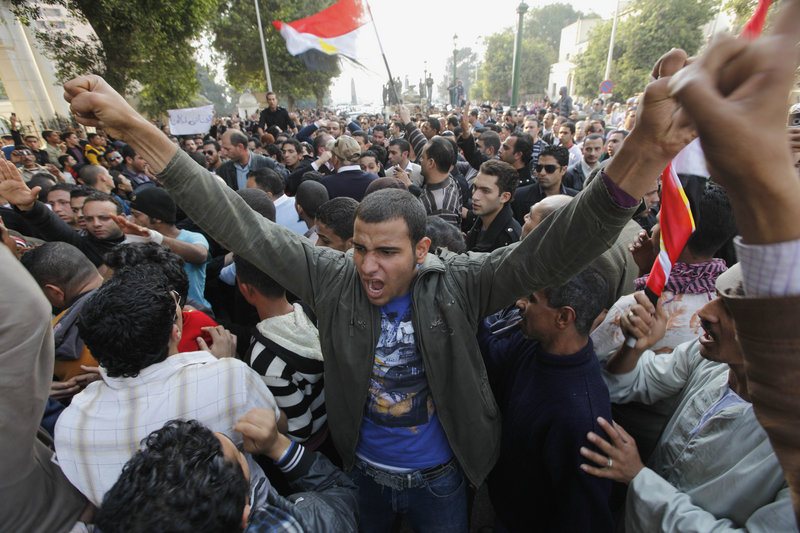CAIRO — Egypt’s new military rulers tried to contain growing labor unrest Monday and to reach out to youthful revolutionaries as the formidable task of governing the politically unstable and impoverished country became apparent.
Police officers, ambulance drivers, bankers, journalists and archaeologists marched through the streets of Cairo in separate protests Monday. Emboldened by a sudden burst of freedom that has flowered since President Hosni Mubarak’s departure on Friday, the demonstrators demanded higher wages and other benefits.
“This is our ideal chance to make our voices heard,” said Ahmed Mahmoud, a bank manager. “You would never see these kind of protests before, not when we had a dictator.”
The Supreme Military Council, which took power after Mubarak’s resignation, responded with a communique in which it urged Egyptians to go back to work, saying the stoppages were harming the country’s security and economy. The council imposed martial law on Sunday, and officials hinted that they would ban strikes if things did not improve.
“Honorable Egyptians regard these demonstrations, which are taking place at a critical moment, as leading to negative consequences,” read the communique, the fifth handed down by the military council since last week.
Meanwhile, leaders of the pro-democracy demonstrations that ended Mubarak’s nearly three-decade rule said Monday that they had begun direct talks with the military chiefs for the first time.
The negotiations, described as exploratory, were held Sunday at military intelligence headquarters in Cairo, said Khaled al-Sayed, a protest organizer who attended. Another round is scheduled for Wednesday.
Representing the Supreme Military Council at the meeting were Maj. Gen. Mohammed Hegazy, an army commander, and Maj. Gen. Mohammed Abdel Fattah, head of military intelligence, according to the protesters.
The generals said an early priority for the military council is to quickly overhaul Egypt’s constitution, which was designed to stifle political opposition to Mubarak.
The council suspended the constitution Sunday but told the revolutionaries that it would soon appoint a committee of legal experts to draft amendments within 10 days. The proposal would be subjected to a referendum within two months, according to an account of the meeting posted by Wael Ghonim, a Google marketing executive and protest leader.
Sayed said the generals expressed sympathy toward the demonstrators’ cause and their desire to return to civilian rule as soon as possible. But he said they gave few other specifics. They also refused, for now, demands to release political prisoners and overturn the state-of-emergency law.
Copy the Story LinkSend questions/comments to the editors.



Success. Please wait for the page to reload. If the page does not reload within 5 seconds, please refresh the page.
Enter your email and password to access comments.
Hi, to comment on stories you must . This profile is in addition to your subscription and website login.
Already have a commenting profile? .
Invalid username/password.
Please check your email to confirm and complete your registration.
Only subscribers are eligible to post comments. Please subscribe or login first for digital access. Here’s why.
Use the form below to reset your password. When you've submitted your account email, we will send an email with a reset code.